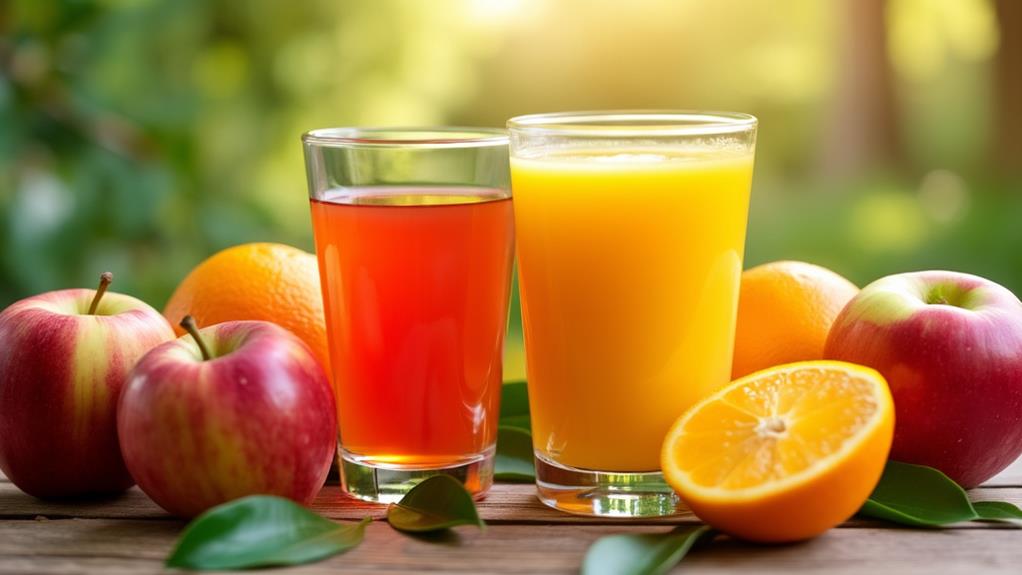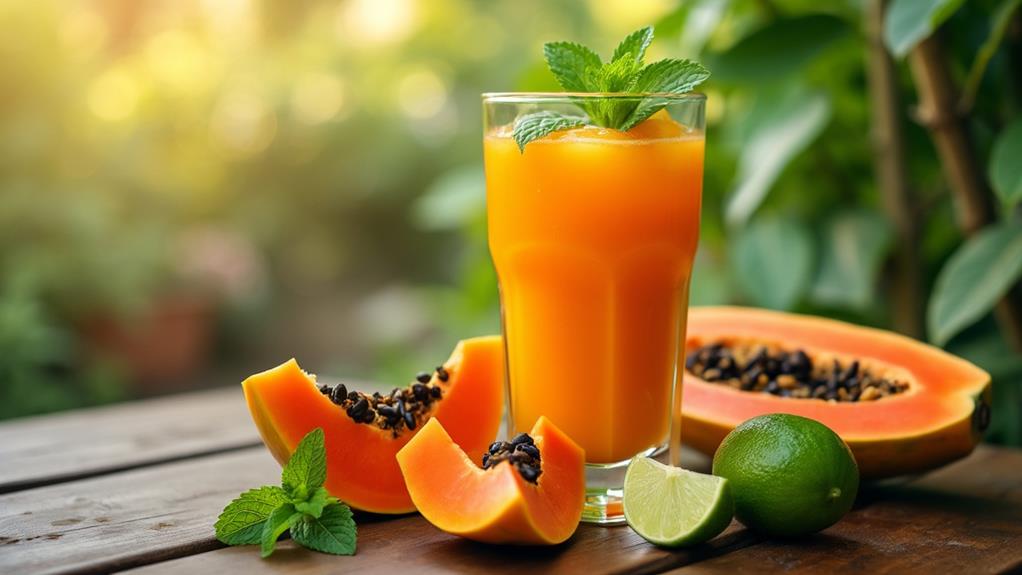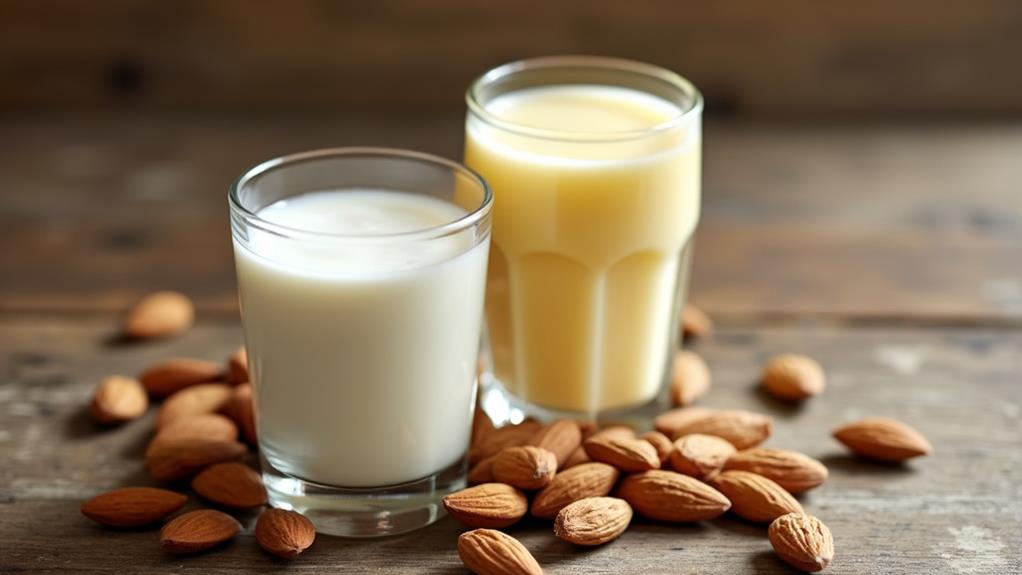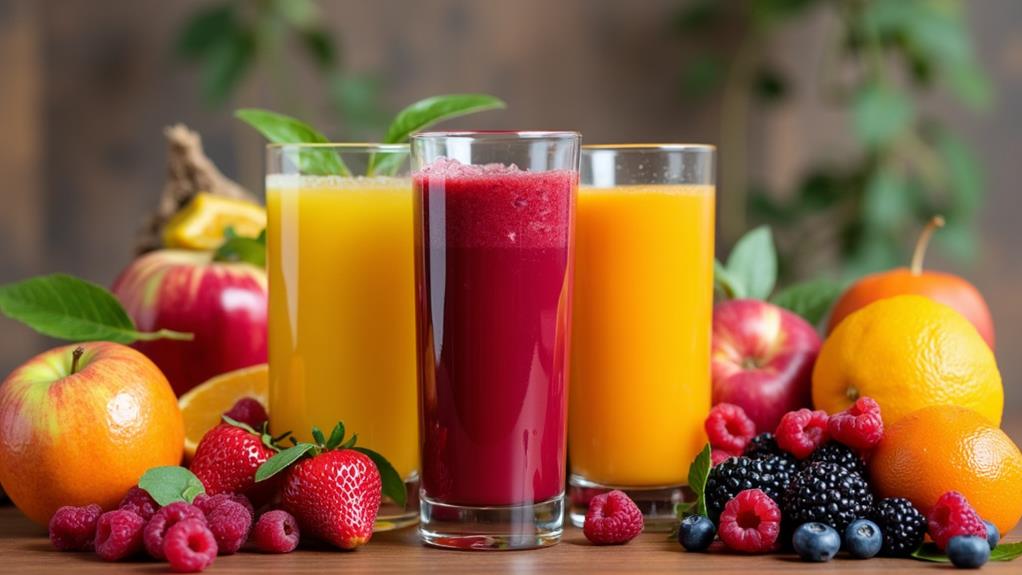Hibiscus Juice: Lower Blood Pressure and Aid Digestion Naturally
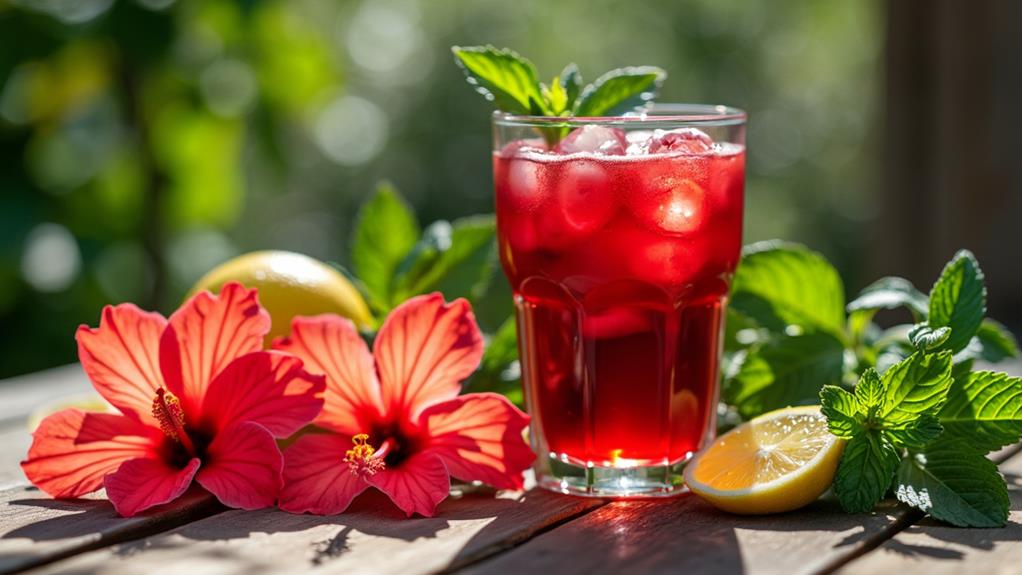
Incorporating hibiscus juice into your diet can help lower blood pressure and aid digestion naturally. This tart, caffeine-free beverage is rich in antioxidants like vitamin C and polyphenols, which strengthen your immune system and combat oxidative stress. Hibiscus juice acts as a natural antihypertensive, helping to reduce systolic and diastolic blood pressure, while promoting heart health. Its diuretic properties help flush out toxins, and its acidity supports healthy digestion by promoting beneficial gut bacteria. Consuming hibiscus juice regularly can lead to these health benefits and more, making it a revitalizing enhancement to your wellness routine. Uncover how it can transform your health expedition.
Understanding Hibiscus Juice
Hibiscus juice's lively allure stems from the calyx of the Hibiscus sabdariffa flower, offering both a tart flavor and a striking red hue. As you savor this invigorating beverage, you're not only enjoying its taste but also its remarkable health benefits. Hibiscus juice is celebrated for its potential to lower blood pressure, particularly systolic pressure, making it a natural ally in managing hypertension. By drinking this colorful juice, you can experience an average reduction of 7.58 mm Hg in your blood pressure, offering a simple yet effective enhancement to your wellness routine.
Packed with antioxidants, including vitamin C and polyphenols, hibiscus juice plays an essential role in promoting digestive health. These antioxidants help combat oxidative stress, which can lead to improved regularity and comprehensive gut health. Furthermore, hibiscus juice supports weight management. It's both calorie-free and caffeine-free, making it a fantastic alternative to sugary drinks that might otherwise sabotage your weight goals.
On the cholesterol front, regular consumption of hibiscus juice has been linked to increased HDL cholesterol and decreased LDL cholesterol and triglycerides. This balance contributes to a healthier cardiovascular system, enhancing your overall well-being.
Antioxidant Benefits
Beyond its role in managing blood pressure and cholesterol, this animated beverage offers a rich supply of antioxidants, making it a powerful ally in protecting your health. Hibiscus juice is packed with polyphenols and anthocyanins that help combat oxidative stress and guard against cellular damage. These antioxidants are essential for maintaining your body's balance, as they neutralize harmful free radicals that can cause diverse health issues.
The health benefits of hibiscus extract extend to reducing the risk of chronic diseases such as heart disease and cancer. By protecting cells from damage, these antioxidants help lower your risk of developing such conditions. Additionally, hibiscus juice is an excellent source of vitamin C, which supports your immune system. A strong immune system is fundamental for warding off illnesses and maintaining comprehensive well-being.
Regular consumption of hibiscus juice may also improve your body's antioxidant levels. Although more research is needed to fully understand its effects, studies suggest that hibiscus extract can notably reduce oxidative stress. By incorporating this lively drink into your routine, you may enjoy its protective health benefits and strengthen your body's defenses against oxidative stress and related health problems.
Cardiovascular Health
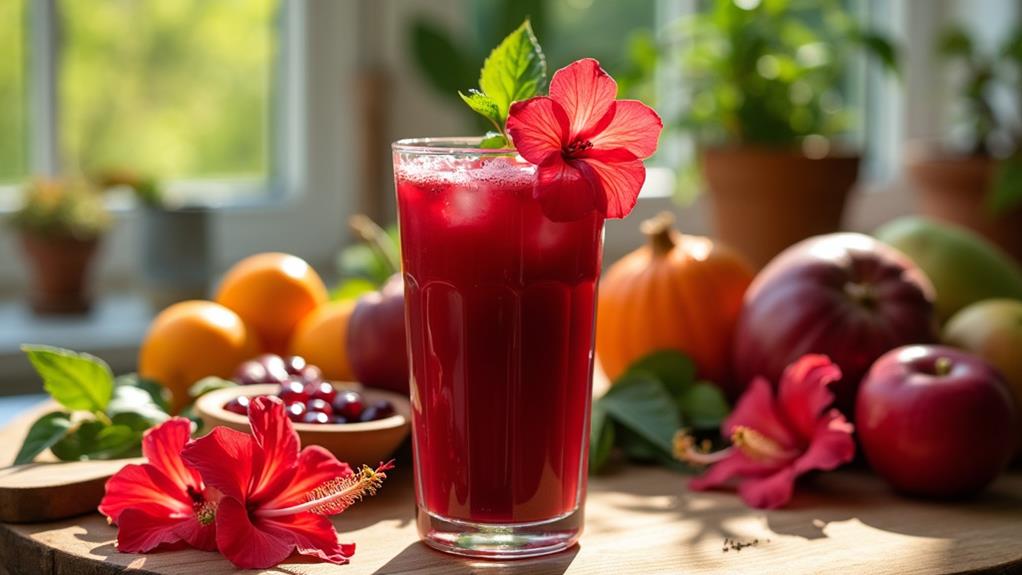
Regarding cardiovascular health, hibiscus juice stands out as a natural ally for maintaining a healthy heart. By regularly consuming hibiscus tea, you can markedly lower both systolic and diastolic blood pressure. A review of five studies found average reductions of 7.58 mm Hg in systolic and 3.53 mm Hg in diastolic measurements, highlighting its potential as a natural antihypertensive remedy. Such reductions can play a vital role in preventing cardiovascular diseases and improving general heart health.
Moreover, hibiscus juice doesn't just stop at lowering blood pressure. It may improve cholesterol levels by increasing HDL (good cholesterol) and decreasing LDL (bad cholesterol) and triglycerides. A 2009 study demonstrated these benefits in diabetic individuals, suggesting that regular intake of hibiscus juice can boost cardiovascular health.
However, if you're on blood pressure medications, exercise caution. The interaction between hibiscus juice and these drugs might lead to excessively low blood pressure. Hence, it's wise to consult with a healthcare professional before adding it to your routine. Accept hibiscus juice as a natural remedy to support and maintain your heart health effectively.
Digestive Support
In regards to digestive support, hibiscus juice offers a range of benefits that can improve your gut health. By promoting a healthy gut microbiome, hibiscus juice supports the growth of beneficial bacteria, which is vital for effective digestion. A balanced microbiome not only aids digestion but also improves nutrient absorption, guaranteeing your body gets the most out of the food you consume.
The high acidity of hibiscus juice can help break down food more efficiently, making it easier for your system to process meals. Furthermore, its diuretic properties assist in flushing out toxins and excess water, contributing to your complete digestive health. This natural cleanse can prevent bloating and discomfort, leaving you feeling lighter and more comfortable.
Hibiscus juice is also rich in soluble fiber, which plays a key role in regulating bowel movements and preventing constipation. This fiber guarantees that your digestive tract operates smoothly, reducing the risk of indigestion. After a heavy meal, reaching for hibiscus juice can provide a revitalizing remedy, alleviating symptoms of indigestion and promoting a sense of relief. Embracing hibiscus juice as part of your diet can greatly improve your digestive well-being.
Weight Management
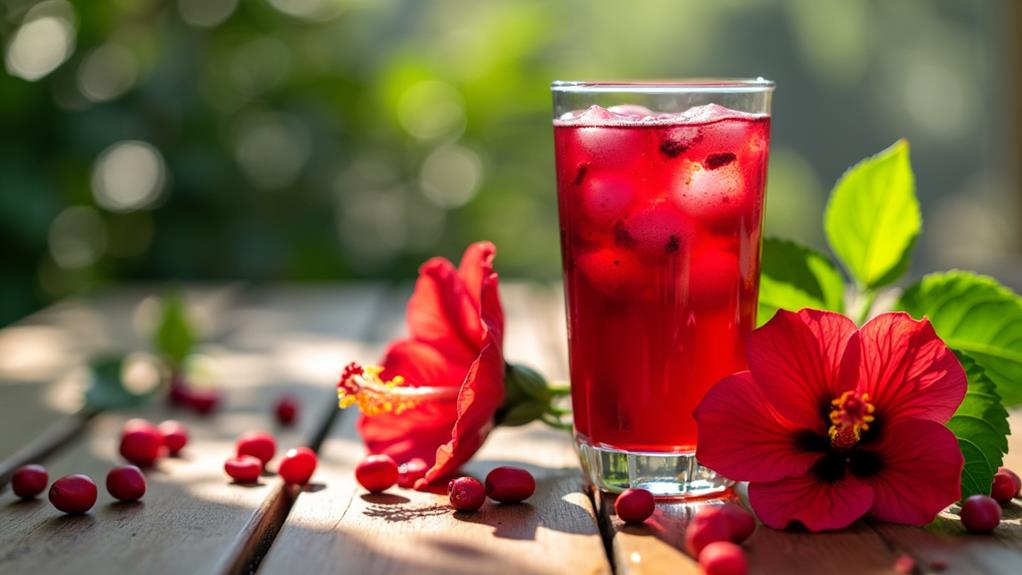
Hibiscus juice can be a powerful ally in your weight-management expedition. It's not just any drink; it's a calorie-free, healthy alternative that can help you shed those extra pounds. A 2014 study found that participants consuming hibiscus extract experienced significant reductions in body weight and fat levels. This makes hibiscus juice an effective tool in supporting weight loss.
But how does it work? Animal studies suggest that hibiscus extract may help reduce appetite and fat accumulation. Imagine sipping on a delicious beverage that naturally curbs your hunger. This appetite reduction is key in managing your body weight and maintaining a healthy lifestyle.
Pair hibiscus juice with other plant extracts, and you could tap into synergistic benefits. A 2023 review highlighted the potential weight loss effects when hibiscus extract is combined with other plant extracts. This combination can improve the health benefits, giving your weight management strategy an extra lift.
Incorporating hibiscus juice into your daily routine complements lifestyle changes like diet and exercise. It's not just about drinking the juice; it's about integrating it into a broader plan for better health and effective weight management.
Liver Health
While hibiscus juice supports your weight-management goals, it also offers impressive benefits for liver health. By increasing the concentration of detoxifying enzymes, hibiscus juice aids detoxification processes, vital for maintaining liver function. These enzymes help your liver process and eliminate toxins more efficiently, promoting overall liver wellness.
Rich in antioxidant properties, hibiscus tea benefits extend to protecting your liver from oxidative stress and damage. The high polyphenol content in hibiscus extract plays a significant role in preventing oxidative stress, which can lead to liver cell damage. Laboratory studies have shown that hibiscus extract can inhibit lipid peroxidation, a process that contributes to liver cell damage, helping to keep your liver functioning effectively.
For those dealing with fatty liver conditions, hibiscus juice offers hope. A 2014 study found that hibiscus extract improved liver steatosis in overweight individuals, highlighting its potential in managing fatty liver conditions. Regular consumption of hibiscus juice has also been linked to a reduction in liver fat accumulation, further supporting liver health. By incorporating hibiscus juice into your routine, you can take a proactive step in maintaining and improving your liver's health and function naturally.
Cancer Prevention Potential
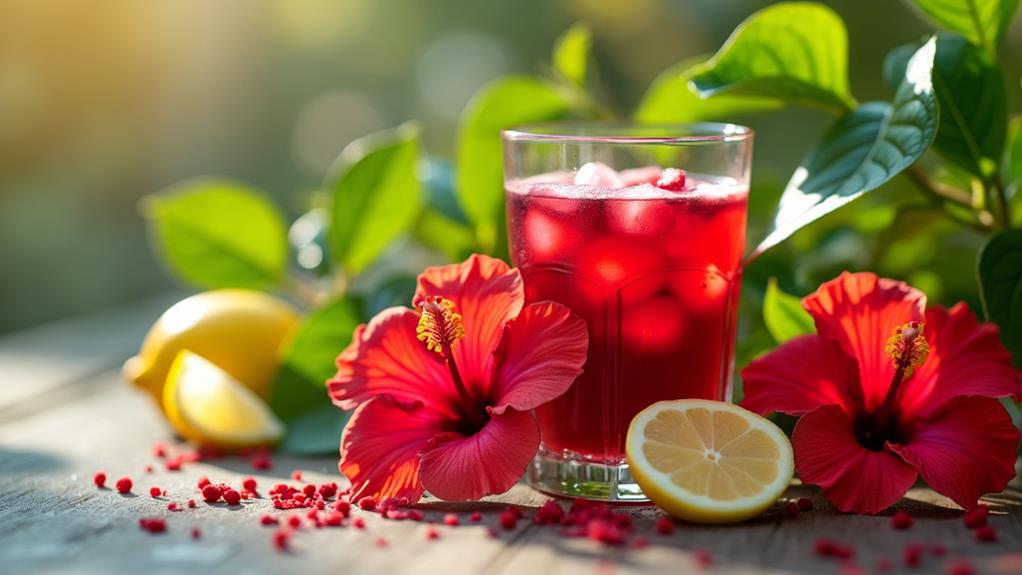
You'll find that hibiscus juice isn't just about liver health; it also holds promise in cancer prevention. The secret lies in hibiscus extract, which boasts powerful anticancer properties. It's rich in polyphenols, compounds known for their ability to impair the growth of cancer cells. Research has shown that these polyphenols can target several cancers, including prostate cancer and stomach cancers, making hibiscus a potential ally in your health regimen.
One of the ways hibiscus extract works is by reducing oxidative stress. Oxidative stress is a significant contributor to cancer development, and the antioxidants in hibiscus, like anthocyanins, help combat it. By minimizing oxidative stress, you may support your body's defense against cancerous changes.
Another fascinating aspect of hibiscus extract is its ability to induce apoptosis in cancer cells. Apoptosis is the process of programmed cell death, and encouraging this in harmful cells can be a key cancer prevention strategy. While these findings are promising, it is crucial to recognize that most of the current research has been conducted in laboratory settings. More clinical studies are needed to fully understand the health benefits and role of hibiscus in cancer prevention for humans.
Risks and Considerations
When considering adding hibiscus juice to your diet, it's vital to be aware of potential risks and considerations. While hibiscus is known to lower blood pressure, if you're taking antihypertensive medications, talk to your healthcare provider initially. Combining both could lead to excessively low blood pressure, which can be dangerous. Furthermore, consuming hibiscus in high doses, especially as an extract, may cause liver damage. To avoid this, moderation is key.
Pregnant and breastfeeding individuals should approach hibiscus with caution. Due to its phytoestrogen content, hibiscus might influence hormone levels, and its safety during pregnancy and breastfeeding isn't well established. Allergic reactions, though rare, can occur, especially if you're sensitive to plants in the mallow family. It's wise to monitor your body's response when you initially try hibiscus juice.
While hibiscus juice can help with digestion, its diuretic properties might lead to dehydration if you consume too much without drinking enough fluids. Making sure you stay hydrated is vital. Always consult with your healthcare provider to confirm hibiscus juice is a safe supplement to your diet, taking into account your specific health conditions and needs.
Preparing Hibiscus Juice
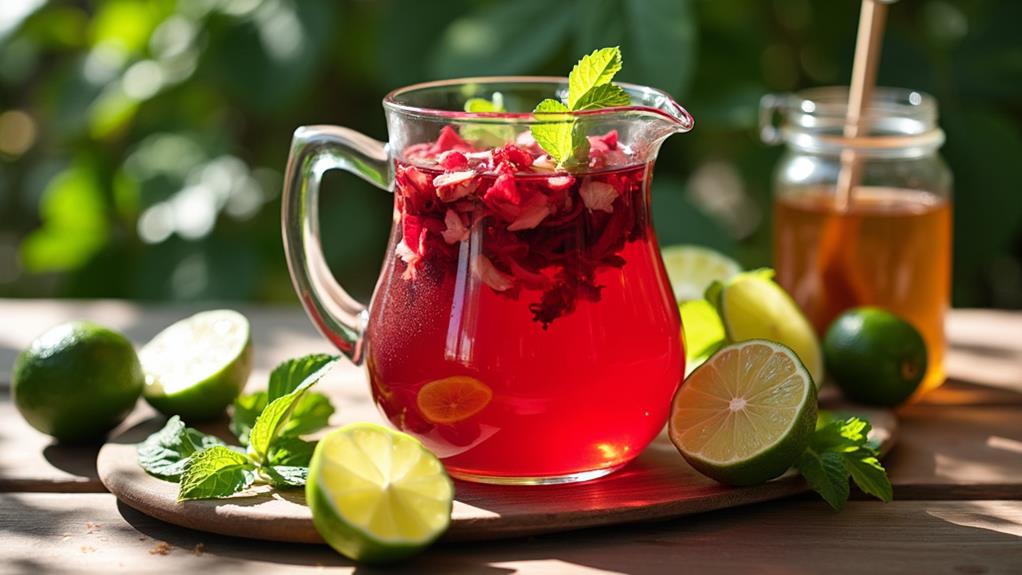
Crafting your own hibiscus juice at home is simple and rewarding. Start by steeping 2 tablespoons of dried hibiscus flowers in 4 cups of boiling water. Allow them to steep for about 15-20 minutes. This process extracts the lively flavor and rich color of the flowers. Once steeped, strain the liquid to remove the solids, leaving you with a beautiful crimson hibiscus juice.
To balance the natural tartness, sweeten your hibiscus juice to taste with honey, agave syrup, or a splash of lime juice. This adds a delightful flavor profile while maintaining the juice's revitalizing qualities. For those hot days, try a invigorating iced version. Just let the hibiscus tea cool down and serve it over ice. You can garnish with fresh mint leaves or slices of citrus fruit for an extra burst of brightness.
If you're feeling adventurous, blend the hibiscus juice with fruits like pineapple or mango. This not only amplifies the flavor but also increases its digestive benefits. Store any leftovers in the refrigerator for up to a week, ensuring it's always ready to support your hydration and digestion naturally.

